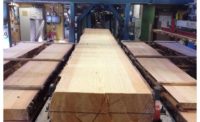International Trade
US-Canada Lumber Trade Fight Intensifies after Panel's Ruling
The long trade battle over Canadian softwood lumber shipments to the U.S. is escalating, after a U.S. trade panel ruled that the exports have hurt domestic producers.
The U.S. International Trade Commission on Dec. 7 decided unanimously that Canadian shipments have "materially injured" U.S. lumber companies. The panel's action clears the way for the Commerce Dept. to impose tariffs on the Canadian products.
The Commerce Dept. on Nov. 3 set tariffs as high as 23.76% on Canadian lumber shipments.
Canada already is preparing to challenge the U.S. move by appealing to international trade tribunals. Minister of Foreign Affairs Chrystia Freeland said in a statement that the anti-dumping and countervailing duties are "punitive" and "unwarranted and troubling." She noted that Canada has started challenges against the U.S. under the North American Free Trade Agreement and before the World Trade Organization.
Freeland added, "The government of Canada will continue to vigorously defend our industry, workers and communities against protectionist trade measures."
U.S. lumber companies hailed the ITC's decision. Jason Brochu, U.S. Lumber Coalition co-chair, said in a statement, "The evidence presented to the ITC was clear—the massive subsidies that the Canadian government provides to its lumber industry and the dumping of lumber products into the U.S. market by Canadian companies cause real harm to U.S. producers and workers."
Susan Yurkovich, president of the Vancouver-based BC Lumber Trade Council, said the decision, "while not unexpected, is completely without merit." Yurkovich contended that U.S. lumber companies were not injured by the Canadian imports, adding that the U.S. industry "was enjoying the most profitable period in its history."
British Columbia accounts for the largest share of Canadian softwood lumber exports to the U.S.
The National Association of Home Builders was disappointed by the ITC's finding. NAHB Chairman Granger MacDonald said in a statement, "We … believe this is a protectionist measure designed to safeguard the interests of major domestic lumber producers at the expense of American consumers."
NAHB has estimated that the tariffs will add $1,360 to the price of a single-family home built next year in the U.S.


